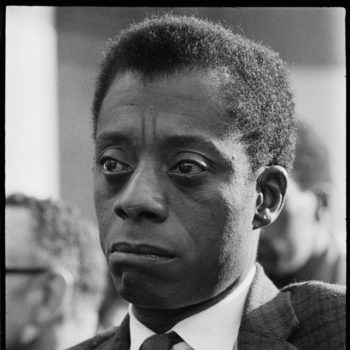Raoul Peck, a Haitian filmmaker, might be best known for “Lumumba,” a fictional movie about the first prime minister of the Congo. He’s also earned a raft of awards for his documentaries and short films — may of which tackle political themes.
His latest documentary, “I Am Not Your Negro” is up for an Oscar. Ten years in the making, it’s about the late, great author James Baldwin, and it’s based on an unfinished manuscript of his called “Remember This House.” However, the film uses the manuscript as a springboard to start a discussion about the racial divide in America.
Using archival footage, interview clips, and excerpts of Baldwin’s work — read by Samuel Jackson — the movie is as transfixing as the man it illuminates. When Brendan spoke with Peck, he started by asking him how the idea for the film began.

Raoul Peck: Most of my project[s] are really personal. I never start a project without being motivated by something that happened or the way I felt. And the Baldwin project came at a moment where I felt that there was no discussion anymore in this country, that the majority thought, “Well, listen, the Civil Rights movement is institutionalized. We have black history month. We have even Martin Luther King Day. We have a museum in D.C. now,” etcetera, etcetera, “So, we made it.”
And in reality, it’s not the case. The problems are still there. They are even worse today. So to go back to Baldwin, for me, was, “How do I bring those words? How do I bring [that] important analysis to this present generation?” That was the agenda. That was the idea, “How do I put Baldwin center stage?”
Brendan Francis Newnam: Well you certainly do that in this documentary because everything we hear is either an interview with Baldwin or his writing. What do you think makes his writing so powerful?
Raoul Peck: Baldwin was the first one to find a way to write about not only the black reality of this country, but also the black, white whole reality of this country, like Faulkner would have done. And Baldwin had to find his own words…
His phrase[s] are so full of intensity, of humor, of humanity, and he speak[s] as well to an intellectual as the man in the streets. That’s a rare faculty.
Brendan Francis Newnam: You know, I wanna talk about the formal nature of this documentary, this isn’t your typical documentary. It doesn’t include talking heads, there are no extensive interviews with people who knew Baldwin. It is just Baldwin’s words center stage. Why did you decide to make it that way?
Raoul Peck: Well, because the project from the start was about Baldwin. I knew that I had to put him in direct contact with an audience. Not through any talking heads or any scholar or any critic that would explain who he is. So, filmically, it was not an easy project to approach and thanks God that Baldwin is an incredible film critic.
Brendan Francis Newnam: Yeah, your documentary incorporates lots of clips from movies he writes about.
Raoul Peck: Yes. You know, he wrote a lot of essays on Sidney Poitier and he point[ed] out as well the contradiction of Hollywood. [With], you know, a film like “[Guess Who’s Coming to Dinner],” I remember as a young man, it was incredible because that’s the first time I was seeing a handsome looking black man, intelligent, who went to college on the screen. And for once, you know, we could actually see them.
Raoul Peck: I was somehow proud, but at the same time I felt something was wrong without really understanding what. And Baldwin gives you the answer because he tells you, “Yes they are using Sidney against us.” Meaning “us” — the rest of this population. Because they were putting an example in front of you that, in order to be accepted by society, you have to be handsome, you have to speak English well, you have to be very intellectual man and otherwise you will never get the girl. So this is basically what the film was telling you.
So what Baldwin teach[es] you is that film is not innocent and cannot be innocent. It’ll be critical, you know, ask yourself, “What am I being served with?” And, “What is the purpose of it?” Because there is a purpose in making you consume popcorns and Coke while you are watching a blockbuster. There is a purpose in that.
Brendan Francis Newnam: Yeah. Baldwin says entertainment is often difficult to distinguish from the use of narcotics.
Raoul Peck: Exactly. And he wrote that 40, 50 years ago, you can imagine what it means today. And that’s why anything in this film, every single phrase, every single word is like, it’s dynamite. It’s dynamite, it’s 100 times more tragic.
Brendan Francis Newnam: So, your movie comes out in a year where there are a number of excellent documentaries about the black experience. There’s the “13th” directed by Ava DuVernay, “O.J.: Made in America.” And then there are also these critically acclaimed fiction movies, including “Moonlight.”
Raoul Peck: Yes, extraordinary film, yes.
Brendan Francis Newnam: What do you think Baldwin would make of this year’s mainstream media offerings?

Raoul Peck: Baldwin, what he would do is go directly to the fundamentals. This is just by chance that there are those many films this year. But it’s not structural. Because structurally, it’s still the same people who are deciding what films should be made. So as long as people as color, women, gays, etcetera, do not have the power to greenlight a story, nothing will change.
Let me give you [an] example. How do I go to a studio? I have a half an hour to pitch my movie. If I’m going to spend 25 minutes to explain to this 35-year-old studio boss, “This is who Baldwin is,” you know, it’s already 15 minutes. And then, “This is why he is important, by the way, not only for me, but also for you.” This is another 10 minutes. And then, I have three to five minutes to pitch my actual project.
You know? You can’t win. You can’t win. And that’s the permanent situation here and that’s why when Baldwin is turning the camera to this vast heedless majority, you know, he’s telling them, “Listen, by the way, this is your problem too. And this is primarily your problem because you invented it, you are the cause of it and you are controlling that. And if you don’t fix it, you’re gonna go down with everybody else.” Because there cannot be a dream if the majority of the people in this country are not living that dream.


